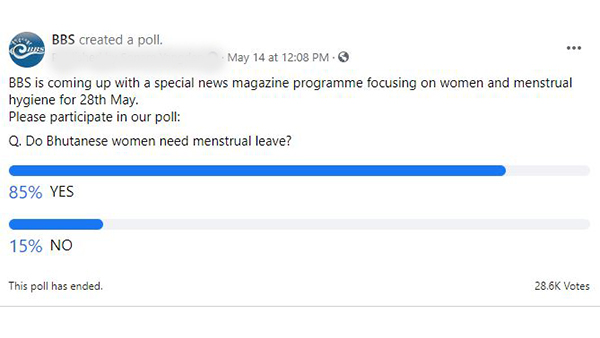 With an increasing number of people in Bhutan aware of concerns regarding menstruation, they are also becoming supportive of menstrual needs and care. However, much has been assumed about menstruation pain and its symptoms. But as the country heightens its advocacy, women now feel the need for paid leave, a time off from work during the period.
With an increasing number of people in Bhutan aware of concerns regarding menstruation, they are also becoming supportive of menstrual needs and care. However, much has been assumed about menstruation pain and its symptoms. But as the country heightens its advocacy, women now feel the need for paid leave, a time off from work during the period.
Khandu Om, a Gopa with the Special Police Branch in Thimphu had her first period when she was 16. And for the last 13 years, she has been couch-bound once every month. To make it worse, her daily job as uniform personnel has made it hard for Khandu to get through her regular work-day, during her period.
“I get period cramps. If it is mild, I do whatever is within my capacity at work. But when it is unbearable, I take a day leave and take a rest,” she said.
Menstruation discomforts are not all the same for every woman. While some experience mild discomfort, for many, it comes with unbearable cramps.
“If it is mild pain, they can just put a water bottle over the lower belly. However, there are cases when women can’t go to work. In such cases, they can always take rest,” said Lt Col Dr Cheni Zangmo, a Gynecologist at the Military Hospital in Lungtenphug.
Considering the excruciating pain during menstruation, Kuensel Corporation has been granting a day leave with pay to its women journalists for the last three years. And recently, the corporation decided to grant a similar leave to all its women employees.
“As men, we can only imagine what kind of pain they go through during the period. We also understand that they go through difficult times, especially when they have to work. While it hampers their work, it could also add stress on their health,” said Ugyen Penjore, the CEO of Kuensel Corporation.
Recently, BBS conducted a poll on Facebook on the need for menstrual leave for Bhutanese women. Of nearly 29 thousand voters, 85 % of them were supportive while 15 per cent did not agree. Some of the voters also commented they had options for flexible work or study hours, during their period.
But despite the difficulties, today, the majority of women turn up for work anyway.
“We can’t even concentrate on our work. If not for more days, I think women should be given a day off. So far, there is no such leave in our country. Although not all women get the same cramp, the majority do,” said Chencho Lham, a Corporate Employee.
“When we are on our period, we get severe abdominal cramp. Even if we attend classes, we can’t concentrate. Instead, we want to take a rest. At home, we feel more at ease. We have our parents and other facilities for our discourse,” said Pema Lhamo, a student in Thimphu.
“It’s really difficult for women to work during their period. Sometimes the pain is so unbearable that we can’t even get out of bed. I think they should consider a leave for us,” added Prunella Chhetri, a Class XII graduate.
Many are of the view that although menstrual leave is necessary for working women and students, they also fear it can rebound to their disadvantage. Many fear that it could lead to further discrimination.
“I think this deserves extensive deliberation for proper implementation. If such a system is implemented, it raises questions on the employability of women by private employers. And this might impact women in the long run,” said Thinley Dema, a Corporate Employee.
“Personally I would not like to go for such leave because I don’t know about the other careers, but as a teacher, we would not like to miss our classes and normally menstruation will go on for five days and for some seven days and minimum three days,” said Yangchen Dema, a teacher of Zhilukha Middle Secondary School.
“It’s good if we get it, but in the long run, it can play against us, especially these days because of the modernity where women are fighting for gender equality,” added Lt Col Dr Cheni Zangmo.
As much new it remains to the general population, menstrual leave is a new idea, even to policymakers. And they say the topic is debatable.
“I think we can always talk about the issue. We can do thorough research and see how many women in Civil Servant are suffering from cramp and know their problems. We also have to see how many days should the leave be. There is always room for discussion,” said Foreign Minister Dr Tandi Dorji, who is also the government’s spokesperson.
An international study showed that a woman losses around nine days of work a year due to period. And many countries, especially in Asia such as Japan, South Korea, Indonesia, the Philippines and Taiwan have introduced paid leave for women.
In between taking painkillers and hugging hot water bottles, perhaps it is women who desire a bit of rest during their period. Workplaces certainly have evolved, but are they more inclusive of women’s needs?
https://www.facebook.com/133972516617260/videos/2874751922743519
Sangay Chezom/Samten Dolkar










